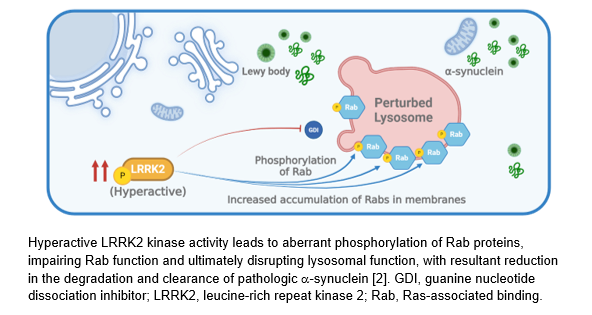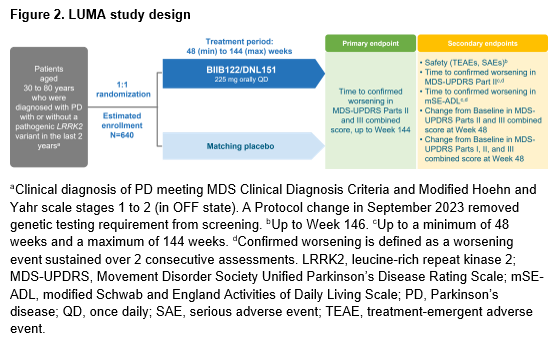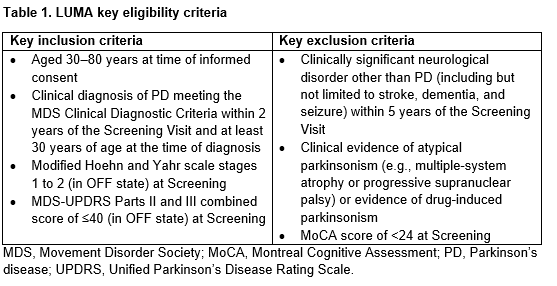Objective: To summarize the rationale for LRRK2 inhibition in sporadic PD patients without LRRK2 mutations, and to describe the current design of the LUMA study, which investigates the safety and efficacy of the LRRK2 inhibitor, BIIB122/DNL151, in participants with early-stage PD.
Background: LRRK2 mutations are typically present in 5–13% of inherited PD and 1–5% of sporadic PD [1]. Both LRRK2-PD and sporadic PD are associated with hyperactive LRRK2 kinase activity leading to aberrant phosphorylation of Rab proteins and subsequent lysosomal dysfunction [2] [figure 1]. Rare disease-causing LRRK2 familial mutations lead to an increase in kinase activity and altered Rab signaling. In sporadic PD, LRRK2 may be activated through environmental factors, [3] specific noncoding genetic variants, and interactions between genetics and the environment [4]. Further, there may be an interplay between LRRK2 activity and α-synuclein; increased LRRK2 activation has been reported in nigrostriatal neurons of an α-synuclein rat model and in post-mortem brain tissues from patients with sporadic PD [5, 6]. Thus, inhibition of LRRK2 kinase activity is a logical, novel and potentially promising approach to disease modification for both sporadic and LRRK2-PD. BIIB122/DNL151 is a central nervous system–penetrant selective kinase inhibitor that reduces LRRK2 activity and improves lysosomal function [7].
Method: LUMA (NCT05348785) is a multicenter, randomized, double-blind, placebo-controlled Phase 2b trial designed to examine the safety and efficacy of BIIB122/DNL151 in participants with early-stage PD. The study protocol was recently updated to include eligible patients irrespective of their LRRK2 genetic status, and genetic testing was removed from screening. Key eligibility criteria are described in Table 1 [table 1]. The study design is illustrated in Figure 2 [figure 2].
Results: LUMA is currently enrolling approximately 640 participants from approximately 110 sites worldwide.
Conclusion: The LUMA protocol is evaluating the safety and efficacy of BIIB122/DNL151 in eligible patients with early-stage sporadic PD, including those with or without a pathogenic LRRK2 variant. LUMA is the most advanced program in clinic for LRRK2 inhibition, with efficacy endpoints that measure clinical progression of PD and biomarker assessments that measure the biological impact of LRRK2 inhibition.
LRRK2 in the pathogenesis of Parkinson’s disease
F2. LUMA study design
T1. LUMA key eligibility criteria
References: [1] Rui Q, et al. Curr Neuropharmacol. 2018;16(9):1348–1357.
[2] Erb ML, Moore DJ. J Parkinsons Dis. 2020;10(4):1271–1291.
[3] Rocha EM, et al. Trends Neurosci. 2022;45(3):224–236.
[4] Chittoor-Vinod VG, et al. Int J Mol Sci. 2021;22(3):1045.
[5] O’Hara DM, et al. Front Neurosci. 2020;14:577.
[6] Di Maio R, et al. Sci Transl Med. 2018;10(451):eaar5429.
[7] Jennings D, et al. Mov Disord. 2023;38(3):386–398.
To cite this abstract in AMA style:
R. Hauser, A. Lang, L. Kalia, JT. Greenamyre, R. Llorens-Arenas, D. Jennings, B. Hersh, K. Fraser, S. Huntwork-Rodriguez, A. Henry, J. Kluss, C. Paisán-Ruiz, Z. Berger. Rationale for LRRK2 inhibition in sporadic Parkinson’s disease and the LUMA trial [abstract]. Mov Disord. 2024; 39 (suppl 1). https://www.mdsabstracts.org/abstract/rationale-for-lrrk2-inhibition-in-sporadic-parkinsons-disease-and-the-luma-trial/. Accessed April 20, 2025.« Back to 2024 International Congress
MDS Abstracts - https://www.mdsabstracts.org/abstract/rationale-for-lrrk2-inhibition-in-sporadic-parkinsons-disease-and-the-luma-trial/



